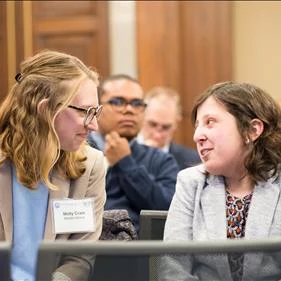Advocates for Inclusion

Students from Washington, D.C. area Hillels joined current and former Hillel professionals on Capitol Hill Tuesday for Jewish Disability Advocacy Day.
During the daylong event, hosted by the Jewish Federations of North America and sponsored by Hillel International, some 250 disability advocates from around the country heard from a bipartisan group of lawmakers, officials and policy experts, including Rep. Jim Langevin (D-RI), co-chair of Bipartisan Disabilities Caucus, and Johnny Collett, the assistant secretary in the Office of Special Education and Rehabilitative Services at the U.S. Department of Education.
“The issues you will learn about and advocate for today will determine and shape the kind of community we live in,” said Gil Preuss, CEO of The Jewish Federation of Greater Washington, welcoming attendees to the Rayburn House Office Building for the annual event.
Those issues included the ABLE Age Adjustment Act, which makes the ABLE program (tax-advantaged savings and investment plans to ease financial strain for people with disabilities) available to people with disabilities who become disabled later in life; and the EMPOWER Care Act, which helps individuals with disabilities and low-income older adults make the transition from living in an institution to living in the community.
“Our obligation is to make sure everyone in our community lives a life of freedom and self-determination,” said Washington, D.C. Rabbi Lauren Tuchman. “This is a sacred value.”
Tuchman’s message was one of several that resonated with Goucher College student Madison Wester, who serves as a Hillel Ruderman inclusion ambassador on campus and the president of Equal Access, Goucher’s disability advocacy group.
“The idea that we can’t be ‘all’, without being inclusive to ‘each,’ was an important facet of the conversation for me. You must find a way to include everybody in order to have inclusion for everyone,” said Wester. “The other takeaway was that 50 percent of the population is involved in disability in some way, whether themselves or a loved one. We are a political power and we need to come together to be that political power and work together, because disability doesn’t discriminate based on political party.”
Wester said she plans on bringing many of the advocacy “tips and tricks” she learned at JDAD back to campus.
“One of the biggest issues we’re facing on campus right now is our lifts and elevators not working,” she said. “We’ve been trying to make that happen with campus. Learning how to do to the political side of this work will be helpful to bring back to campus and make a difference there.”
Hannah Henschel, an associate at the HillelU Center for Engagement and Wellness, who helped lead the Hillel delegation to JDAD, said that participating in the conference helped to “reinforce the work we’re doing we’re doing at Hillel International on disability inclusion on campus.” Yet, she added, there is more work to do.
“I think there’s still room to grow,” Henschel said. “Right now, we have 26 Ruderman inclusion ambassadors at 15 campuses. We’d love to see that progress. We’ve also love to see the cultural shifts they’ve been working to bring about on campus reach the entire Hillel network.”